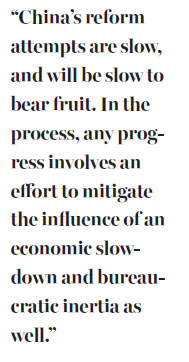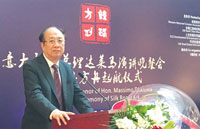Why reform can be ponderous
Updated: 2016-06-03 08:18
By Ed Zhang(China Daily Europe)
|
|||||||||
Locally and departmentally built barriers often compromise the capability of China's administrative system to get things done
Unsympathetic critics of China often say its reform is too slow. But quick or slow, it is not China's choice, though its government seems enormous and able to take on many functions that other governments can't.
A recent meeting with some city-level officials in human resources management, which Chinese often call talent management or talent strategy, revealed to me why reform can be so hard within a large administration, even in a time of electronic communications.
There are lots of new industries in the city. Inevitably, local companies would want to hire some individuals from abroad with plenty of expertise.

Such individuals, according to guidelines from the central government, deserve the same rights as local residents and may even be eligible for some financial subsidies for moving to China.
But no, the officials said, they can enjoy local residential status in only one city. Their rights are applicable only locally, and in other Chinese cities, for instance, where they arrive on flights.
When different cities grant different overseas individuals local residential rights, none of them is supposed to enjoy the same rights in all the cities of a province, even less in all the cities of the People's Republic of China.
Such nationally fragmentary, logically contradictory policies to promote the "import of talent" into China can be disastrous in many ways, first of all in limiting the country's capability to lead an innovation-driven economy, a national goal President Xi Jinping emphasized last week in Beijing.
The existing talent rules virtually mean that each specialist can be treated as a specialist in only one city - not when the person attends a professional conference, or participates in a joint venture elsewhere. They reflect a wrong concept - that the individual is not to be treated as a specialist needed by China, but a person to be owned by a local bureaucracy.
Locally and departmentally built barriers often behave like this to compromise the seemingly all-around capability of China's administrative system. They destroy the uniform standards of a working government.
There must be additional institutional barriers for reforming state-owned enterprises, and for creating a better regulatory environment for foreign and private businesses.

Before Xi and Li Keqiang took office as China's president and premier, such situations had already been rampant - for overseas individuals working in this country and worse still for Chinese citizens.
The two leaders must have learned about them. And that was why ambitious reform programs were adopted - to change the economy and to improve the government.
Now around three years have passed, and lots of powers of the central government have been trimmed or delegated to the local level. But one can still hear people complain about how life can be made difficult by conflicting rules from different authorities.
Taming a large administrative system is hard, so hard that many politicians choose not to do it. Nor is it like economic reform, for which there are theories and case studies to consult. There is no playbook for making so many departments work to fulfill the same task.
Understandably, therefore, China's reform attempts are slow, and will be slow to bear fruit. In the process, any progress involves an effort to mitigate the influence of an economic slowdown and bureaucratic inertia as well.
The country's top policy advisers are sober-minded enough to tell the public that China is in for a long transition that may last for the next few years at least.
But think about the country's previous transition, from a closed-door, planned economy to manufacturing for the global market. It took more than 20 years.
It took many changes and changes back before it finally reformed all the numbered industrial ministries (such as No 8 Ministry of Machine-Building) out of existence, and created a more or less level, though far from ideal, ground for business competition. The historical lesson is to be remembered.
The author is editor-at-large of China Daily. Contact the writer at edzhang@chinadaily.com.cn
Today's Top News
Eyeing the goal in European football
Suddenly, it's a small world
China looking forward to trade talks with EEU: MOC
Russia to promote EAEU-China economic cooperation
AIIB 'set to earn international trust, credibility'
EIB and AIIB to strengthen cooperation
Some 13,000 migrants saved, over 700 dead
Economists urge go-slow on EU's anti-dumping
Hot Topics
Lunar probe , China growth forecasts, Emission rules get tougher, China seen through 'colored lens', International board,
Editor's Picks

|

|

|

|

|

|







